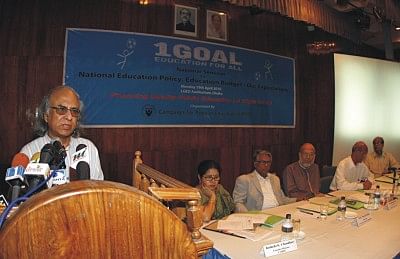Making edn sector free from corruption more important

Dr Qazi Kholiquzzaman Ahmad speaks at a seminar on education policy at the LGED auditorium in the city yesterday. On his left are Rasheda K Choudhury, Prof Nazrul Islam, Kazi Rafiqul Alam, Nurul Islam Nahid and Dr Manzoor Ahmed.Photo: STAR
Making the education sector free from corruption is more important than merely increasing the budgetary allocation for it, said Education Minister Nurul Islam Nahid yesterday, as the educationists stressed the need to raise the allocation to 6 percent of GDP.
"A qualitative change needs to be brought to everything from the education ministry to the managing committee of primary schools. Those involved in education must be free from corruption. Otherwise a new, idealistic generation cannot be developed," he said at a seminar.
The Campaign for Popular Education (Campe) organised the seminar on the 'National Education Policy, Financing in Education: Our Expectation' at the LGED auditorium in the city as part of the Global Action Week-2010 that began yesterday with the slogan 'Education for All'.
University Grants Commission (UGC) Chairman Prof Nazrul Islam suggested that the government takes measures to bring a balance between the fee and salary structures of the private and public universities.
While students in the private universities pay too high for education, public university students pay very little, he said.
Addressing the seminar as the chief guest, Nurul Islam Nahid said increasing allocation for the education sector is a huge challenge in the light of the new education policy, but it will be possible for the government to gradually increase the budgetary allocation from present 2 percent to 6 percent of the GDP.
However, there needs a 'dramatic change' in the education administration, which will implement the policy to teach the new generation with modern technologies and inculcate sense of patriotism and moral values in them, he said.
"Misuse of the money must be checked. The public money must be spent very carefully," Nahid added.
The new education policy, which is about to be finalised, has been prepared on the basis of the national needs, not on partisan interests. "However, it can always be changed in line with the modern educational concepts."
National Education Policy Formulation Committee Co-Chair Dr QK Ahmad said this fiscal year's budgetary allocation for education is Tk 14,034 crore, but to implement the new education policy in nine years, an additional Tk 8,000 crore, on an average, will be required a year.
Including other costs, total allocation should be around Tk 34,000 a year, he said, adding that this is possible if the GDP growth reaches 6 to 8 percent in the coming years.
Rasheda K Choudhury, executive director of Campe, Dr Manzoor Ahmed, senior adviser to the Institute of Educational Development of Brac University, and Kazi Rafiqul Alam, chair of Campe, also spoke.

 For all latest news, follow The Daily Star's Google News channel.
For all latest news, follow The Daily Star's Google News channel. 



Comments